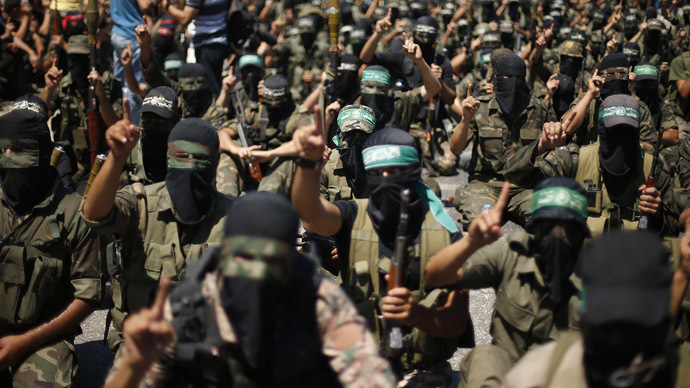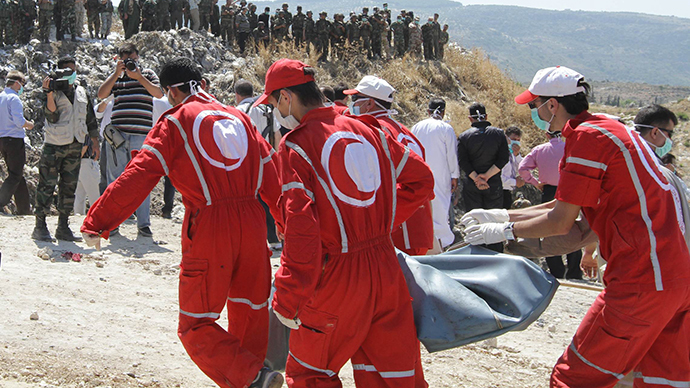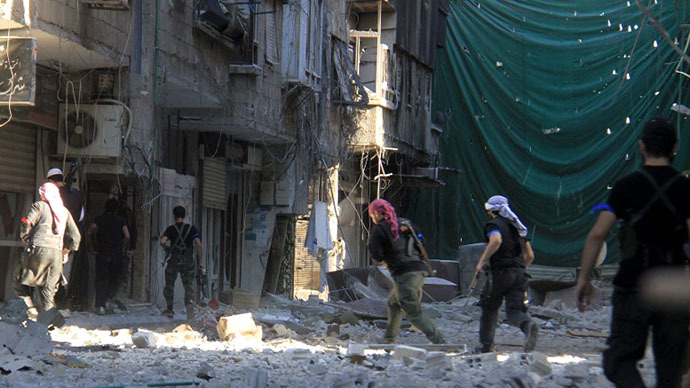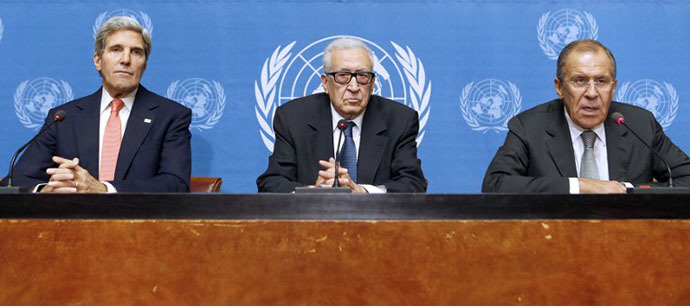‘They aren’t real Muslims’: Radical mercenaries kidnap, kill both Syria Christians and Muslims

Nadezhda Kevorkova is a war correspondent who has covered the events of the Arab Spring, military and religious conflicts around the world, and the anti-globalization movement.
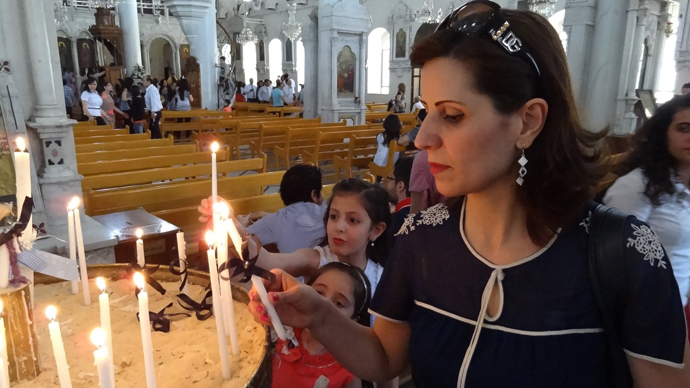
Syrian Orthodox Christians light candles before a mass marking the Palm Sunday in the Syrian capital in Damascus (AFP Photo / Louai Beshara)
Metropolitan Elias Kfoury of the Orthodox Patriarchate of Antioch, Southern Lebanon and Western Beqaa spoke with RT’s observer Nadezhda Kevorkova in the biblical city of Sidon, located on the Mediterranean coast of Lebanon, in a church constructed in the building where the final meeting of the Apostles Peter and Paul took place in 58AD. Christians of the East view the war in Syria neither as civil nor as sectarian, Orthodox Bishop Elias Kfoury told RT. He also spoke of those who unleashed a conflict in Syrian society which hadn’t seen any religious hostilities in the past.
The Metropolitan’s residence is located in the very heart of the old city. It’s not easy to find, however any passing Muslim would show you the way to Metropolitan Elias’s place. Some of his parishes are located in the area populated by Shiites and controlled by Hezbollah. Others are on the territory of Sunni homes and Palestinian refugee camps. Presently the largest Syrian refugee camp is also located there. The cave where Mary was waiting for Jesus, and the cave where the evangelical wedding in Cana took place are a part of his eparchy. For 22 years some of his congregation lived under Israeli occupation. Twice, in 2000 and in 2006, their churches were bombed and destroyed by Israelis. During open hostilities campaigns anyone could find a shelter in Orthodox churches in spite of their religion, whether they were Sunni, Shiites, Druse or Catholics. So the Metropolitan has quite a profound understanding of the current situation that has been developing in Syria and is about to overtake Lebanon. He’s been walking this ground and talking to these people for a long time.
RT: Your Eminence, two Orthodox bishops, Metropolitan Paul of Aleppo and Metropolitan Gregory of the Siro-Jacobite Church were abducted at the Syrian border with Turkey in April of 2013. Rumor had it they were killed last summer but then media refuted this information. What’s the latest on their whereabouts?
Metropolitan Elias Kfoury: All we know is what people are saying. There haven’t been any official reports about their kidnappers or the location of these bishops. Two weeks ago we heard that someone saw them both safe and sound, that they were taking walks, and working out, and eating well. But there hasn’t been any real evidence, or any certain information regarding these bishops. What’s really sad and frustrating is that the abductions were performed by foreigners who had entered Syria. They are allegedly Muslims but their actions contradict Islamic principles. Those people aren’t the real Muslims. They abducted faithful individuals who had been sharing love and peace, who were not military actors!
Those people abduct civilians, Christians, Muslims, or pilgrims. All these things really remind of times when pagans used to kill believers.
RT: In the Western world, every abduction or murder of Christians in Syria is viewed as proof of Islam’s war against Christianity, like it was previously in relation to Iraq.
EK: Muslims and Christians are brothers. We can talk a lot about it. The Koran speaks very highly of Christians, and Muslims know it. The Prophet Mohammed sent his people to the Habeshi kind of Ethiopia to inform him that his people were believers and that they would not kill or hurt them. Whereas these foreigners are given arms, they are sent to wage war and to kill. They burn down churches and contaminate the Christian cross.
We have to ask the rulers of Muslims countries: why are you doing this? We are hurting because these alien people perform their deeds in the name of Islam.
Why did they occupy Maaloula? It’s a place where only civilians lived. There were no armed units or army troops there. Let the Arab countries answer this question – who are they sending to Syria, who are they arming.
RT: What’s the scope of destruction and atrocities in relation to Christians?
EK: Dozens of churches were destroyed all over the country wherever the rebels showed up. The patriarchy keeps track of them – in Homs, Aleppo, Raqqa, and Damascus. They attacked one church in Arbine, 10 km from Damascus, and fire destroyed all of it. I prayed there among its ashes.
Two metropolitans and three Orthodox priests were kidnapped. Two of the priests died. They blinded father Fadi Haddad, an Orthodox priest from Aleppo. In Hama, another priest, father Basilios Nassar took his friend and went to rescue a wounded man, and was shot dead by a sniper.

AFP Photo / Louai Beshara
RT: Do you think they treat Orthodox Christians with deliberate, selective cruelty? They did kill the Catholics as well.
EK: It’s a difficult question. We don’t know what’s on their mind in terms of this issue. Not all of the insurgents are acting this way. There are some decent rebels representing the good Syrians. But those performing such atrocities are mere terrorists who do not recognize any religion. They don’t even recognize Muslims. We don’t know what their objective is. But we see that the very existence of Christians in the East is now jeopardized.
RT: Who has an interest in forcing Christians to flee from the East?
EK: These are terrorist groups that act on behalf of Al Qaeda. And these groups have been mushrooming: there’s Jabhat al–Nusra, there’s the ISIL and others. And they all consist of radical militants who oppose everyone, including Muslims. Anyone who thinks differently must be killed, first and foremost Christians, they say. And new groups keep emerging.
RT: But why would they do this? What is the reason for radicalism and zero tolerance to communities that have co-existed here for centuries?
EK: They have a different understanding of Islam. They are not Syrians. Those who kidnapped our priests are not Syrians.
We know what the Syrian people are like. I’ve lived in Syria for twenty years. Syrians don’t care about your religion. When you visit a Muslim home, the hosts will give you the warmest welcome ever. They are very kind-hearted people, who respect others. Unfortunately some of them are illiterate, they lack education – I’ve met such people. But they don’t hate Christians or Christianity. They may be illiterate, but they are nice people – that’s what Syrians are like.
I can’t really figure out where all these radicals come from. This is so untypical of Syria and just as hard to explain.
These people come from Libya, Saudi Arabia, the Caucasus, Afghanistan, Pakistan, Tunisia – everywhere.
We are convinced that Syrians are the least aggressive nation in the East and they would never perpetrate such evil acts. We know the Syrian people very well.
The Saidnaya Monastery, a well-known Christian shrine in Syria, is visited by more Christians than Muslims, which proves that Syrians cannot do any harm to Christians. In Saida, I am often invited to visit Muslim families in their homes and I can say they are very friendly.

Syrian Christians attend Christmas Day mass at the Saint George Monastery in Mishtaya, some 50 kms from Homs (AFP Photo / Louai Beshara)
RT: The West is trying to find explanations for today’s events in the past. Are there indeed any clues in history that would perhaps help to understand what’s happening now? Is this a religious war, or a civil war? Do we still run the risk of the Syrian conflict spilling over to Lebanon?
EK: Our history has been marked by repeated clashes between Christians and Muslims, between various Muslim communities, between the Druse and the Christians. We walked some rough paths in our history – just like Catholics and Orthodox Christians had differences, blaming one another and fighting with one another. We, however, have mostly preferred to wage a war of words.
But what we see today looks like a political plot to start a war under religious slogans. And we can see the groundwork for this already underway.
Some time ago Baalbek, a Shia-dominated town in Lebanon, saw a minor clash between the Shia and the Sunni. Now, everyone talks about the Shia-Sunni tensions these days. Then a skirmish happens – as if to confirm these speculations. This is scary. This looks like part of a plot to drive a wedge between Syria and Lebanon and destroy them both. That’s why we have Jabhat al-Nusra and others on the ground – they even have their agents here in Tyr, in a Palestinian refugee camp.
Those who have come to destroy our nation are using religion as a disguise.
RT: Don’t you think that efforts to stave off the US strike against Syria or the UN decision to destroy Syria’s chemical arsenal has somewhat eased the tensions?
EK: We know it’s a long way to go. There has been too much devastation, too much misunderstanding between various groups. There are so many Sunni and Shia Muslims, Christians, Druse, Alawites who know too little about religion. And so when somebody tells them to view Muslims or Christians as their enemies who have connections with the West, labeling Christians as crusaders, these people take this message as an instruction manual and start maltreating Christians.
We like to say that man is his own ignorant enemy. Whenever someone calls me a crusader, I tell him he should learn more about me and about where I stand. Before you judge me, get to know me better first – that’s my opinion.
RT: Thank you very much, Your Eminence.
EK: We have been bound together throughout history: our church and the Russian church, our nation and the Russian nation. I would like to thank the Russian Church and the Russian government for their role in preserving peace and aiding the weak and the poor in our region. We are very grateful to you. Our people love the Russian people. Some even have portraits of Vladimir Putin in their homes. Patriarch Kirill is in our hearts. We love Russians because we feel how close they are to our people. We feel that they protect us not for their own benefit, but because they feel like doing it and because it’s just so human





